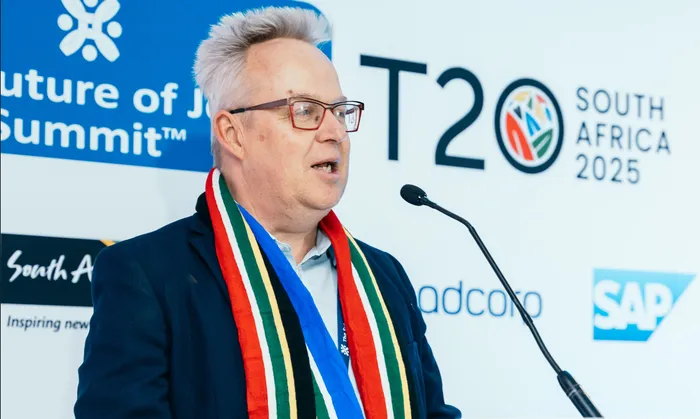South Africa’s billion-rand opportunity in F1’s digital economy

Dr Nik Eberl is the Founder & Executive Chair: The Future of Jobs Summit™ (Official T20 Side Event) .He will be writing a regular column in Business Report.
Image: Supplied
When South Africans talk about Formula 1, the conversation usually centres on whether Kyalami will host a Grand Prix again, how much it would cost, and whether government can justify the spend. Yet while we debate tarmac and tax breaks, a parallel Formula 1 is unfolding — one that doesn’t require billions in infrastructure or international approvals. It lives in games, esports, digital twins and creator platforms. And it could be worth more to our economy than the physical race.
The official lap counts often quoted — such as the 847 million laps run in F1’s video game last year — should be a wake-up call. F1’s digital platforms attract millions of players worldwide, and esports competitions regularly draw hundreds of thousands of live viewers. The grid of the future is as much digital as it is physical. The question is whether South Africa will take its place on it.
A Market We Already Own
South Africa already has a formidable base. Industry research shows there are 26.5 million gamers in the country, and the local gaming industry generated around R7.3 billion in revenue in 2023 — a 52% jump year-on-year. Ninety-one percent of that comes from mobile titles, which means gaming is not a niche pastime: it’s mainstream, affordable, and woven into the lives of young people. On average, South African gamers spend about R480 a year on games. Scale, not spend per head, is the real advantage.
Our demographics reinforce the case. With a median age of 27, South Africa has one of the youngest populations of any middle-income country. That means millions of digital natives already fluent in gaming, social media and online communities — the exact building blocks of esports and the creator economy.
Why F1’s Digital Economy Matters
F1’s digital ecosystem can be grouped into four pillars:
- Esports and Simulation Racing. The official F1 Esports Series and other sim-racing competitions attract large audiences. While the prize pools are smaller than mainstream esports like Dota or League of Legends, they are growing, and international teams are professionalising the space.
- Content Creation. From YouTube explainer channels to TikTok highlights, a new generation of F1 commentators and streamers are monetising global fandom. A handful earn millions, but the opportunity lies in hundreds of smaller creators building sustainable incomes.
- Digital Twins. Virtual replicas of F1 circuits open doors for paid experiences — virtual track days, corporate events, even branded tourism. The sums generated (billions in virtual tourism) are significant, and pilot projects have proven demand.
- Data and Analytics. Every car on track generates terabytes of telemetry. While the exact monetisation figures are guarded, F1 has already partnered with tech firms, broadcasters and betting platforms. Similar opportunities exist for local data and gaming firms if we position ourselves early.
South Africa’s Edge
What sets South Africa apart?
- Demographics. A large, young, digitally fluent population compared to Europe’s ageing fanbase.
- Culture. Our global influence in music, fashion and design gives South African creators a unique storytelling edge. Imagine an F1 content channel infused with amapiano or African design aesthetics.
- Location. Our time zone sits neatly between Asia and Europe, ideal for global streaming.
- Infrastructure. Internet cafés and gaming lounges — often dismissed as entertainment — can be upgraded into esports training hubs and creator studios.
A Three-Step Playbook
If South Africa is serious about economic opportunity, we should stop asking whether we can “afford” an F1 race and start asking how we monetise the digital economy already here. The roadmap is clear:
- Build the pipeline: Within the next 18 months, government and private sector should map gaming cafés, develop short courses in esports, game design and digital content, and launch bootcamps for young creators. Telcos and banks can fund scholarships and seed grants — a modest investment compared to stadiums or hosting fees.
- Launch a national league: By year three, we should establish a national F1 esports league, sponsored by telecoms or financial services, with regional qualifiers feeding into a televised or streamed national final. Prize pools don’t need to be massive at the start — visibility, pathways and credibility are what matter.
- Monetise digital infrastructure: From year three onwards, invest in a high-quality digital twin of Kyalami or a purpose-built circuit. Use it for virtual track days, corporate training events, and branded creator challenges. Let the market validate which streams scale; don’t bet on billion-rand projections without testing.
Why It Matters
This is not just about games. It’s about jobs. Careers in digital sports span developers, producers, event organisers, data analysts, community managers, and creators. Salaries range from R350 000 for entry-level community roles to R500 000+ for developers, and top creators can earn in the millions. A target of 10 000 new digital careers by 2030 is realistic — that’s R5 billion in new salary income in a country where youth unemployment hovers at crisis levels.
It’s also about infrastructure. High-speed connectivity is non-negotiable for esports and VR. Telcos have struggled to justify the business case for 5G; gaming and esports provide it.
And it’s about influence. Countries across the world — from Brazil to the US — are already monetising F1 digitally through creators and esports. South Africa can either lead Africa’s digital motorsport scene, or watch our talent migrate abroad.
Dr Nik Eberl is the Founder & Executive Chair: The Future of Jobs Summit™ (Official T20 Side Event). He is author: Nation of Champions: How South Africa won the World Cup of Destination Branding
*** The views expressed here do not necessarily represent those of Independent Media or IOL.
BUSINESS REPORT